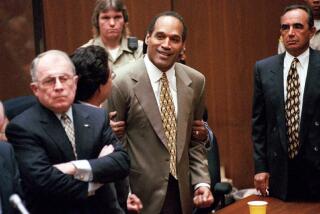Max Solomon; Lawyer for Bugsy Siegel, Mickey Cohen
- Share via
Max Solomon, colorful veteran criminal defense attorney whose clients included Benjamin (Bugsy) Siegel and Mickey Cohen, has died. He was 83.
Solomon died Wednesday at Cedars Sinai Medical Center, where he had undergone surgery for an undisclosed problem in early December, said an attorney colleague, Leonard Kohn.
Kohn said Solomon had continued to confer with clients until quite recently, although he had not argued cases in court for several years.
For half a century, Solomon defended gangsters like Siegel and Cohen, bookies, madams and gamblers.
“Somebody’s got to represent them,” he told The Times in 1981. “Might as well be me.”
A regular at the Redwood bar adjacent to his office on 2nd Street in downtown Los Angeles, Solomon set a certain style with his wide suspenders, blue star sapphire pinky ring, and 1940s suits with bat-wing lapels.
He knew the foibles of his clients--including Siegel’s hatred of the nickname Bugsy , earned by his bad temper.
“Other than his temper,” Solomon said of Siegel, who was murdered in 1947, “he was a charming guy. The Hollywood crowd loved him. At a hearing once, I looked around and there were some of the biggest stars in town cheering him on. It was like a celebrity show.”
“Benny was a nice guy in public,” Solomon told The Times in 1989. “But he was a vicious gangster and shouldn’t be glorified.”
Solomon said Cohen, who died of cancer in 1976 after a long prison term, loved publicity.
“Most gangsters didn’t,” he said. “But when one of Mickey’s guys would get arrested--everybody called them ‘the Seven Dwarfs’--he’d shout ‘Pose!’ ”
Generally Solomon stopped short of socializing with Siegel and Cohen and their cohorts. But he believed they were as entitled as anyone to have a proper defense, which he provided with flair.
“Like they say,” he told The Times, “you get them acquitted, but you don’t shake their hand.”
Solomon went into law during the Depression, and chose criminal defense over civil cases because they paid faster.
His first case, which he dubbed “The Old Lady in the Bathroom,” became the first anecdote in his colorful courtroom reputation.
He was defending an elderly woman, arrested during a raid on a penny-ante poker game. She had to use the bathroom just after the raid, and Solomon learned that while she was in the bathroom, a policeman stood by the door.
“It was perfect,” Solomon related years later.
When the officer was on the witness stand ready for cross-examination, Solomon shuffled from the defense table to the witness stand. He carefully exaggerated a limp he had had since an automobile accident temporarily paralyzed him when he was 15.
He looked at the officer wordlessly and then walked away shaking his head. After pausing dramatically, he approached the vice officer again, stared reprovingly, and said, “Aren’t you ashamed!”
He won.
Solomon’s scrapbooks were jammed with clippings and photographs, and clusters of yellow notes from jurists proclaiming “not guilty.” There was also a note from a judge saying, “You deserve a medal for originality on this one.”
The compliment was not for a case, but on Solomon’s arrangement to pay an annoying court hanger-on 50 cents a week not to talk to him.
In 1976, the Criminal Courts Bar Assn. of Los Angeles gave Solomon its Jerry Giesler Memorial Award as outstanding criminal lawyer.
More to Read
Sign up for Essential California
The most important California stories and recommendations in your inbox every morning.
You may occasionally receive promotional content from the Los Angeles Times.













